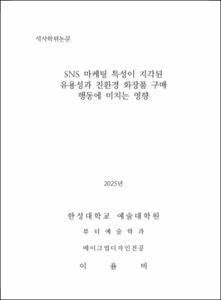SNS 마케팅 특성이 지각된 유용성과 친환경 화장품 구매 행동에 미치는 영향
= The Impact of Social Media Marketing on Perceived Usefulness and Affinity Cosmetics Purchase Behavio
- Type
- Thesis
- Advisor
- 박경옥
- Department
- 예술대학원 뷰티예술학과
- Issued Date
- 2025
- Publisher
- 한성대학교 예술대학원
- Keyword
- SNS 마케팅 특성; 친환경 화장품; 구매 행동; 지각된 유용성
- Files in This Item:
-
-
Download
 200000860856.pdf
기타 데이터 / 826.27 kB / Adobe PDF
200000860856.pdf
기타 데이터 / 826.27 kB / Adobe PDF
-
Items in Repository are protected by copyright, with all rights reserved, unless otherwise indicated.